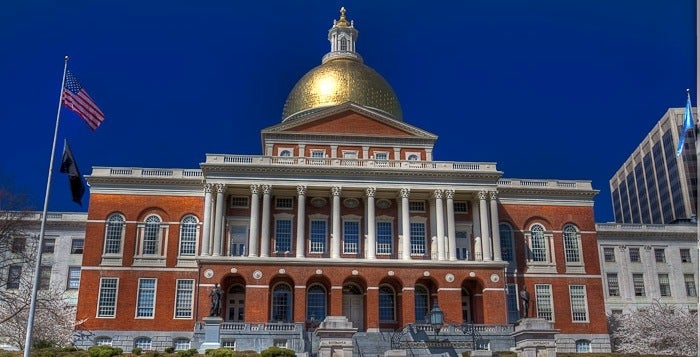With sluggish revenues testing Gov. Charlie Baker’s ability to balance investment needs with fiscal prudence, one of the country’s largest credit rating agencies on Friday downgraded the state’s bond rating with an admonishment for its approach to savings.
S&P Global Ratings lowered its rating for Massachusetts bonds to AA from AA+ in a move that could impact borrowing costs for the state and serves as a black eye for the Baker administration and budget officials in the Legislature who pride themselves on budget management.
“The downgrade reflects what we view as the commonwealth’s failure to follow through on rebuilding its reserves as stipulated through its own fiscal policies aimed at mitigating the state’s propensity for revenue volatility,” S&P Global Ratings credit analyst John Sugden said.
That volatility has led to a $439 million gap between the amount of revenue state officials wrote into the revenue column for the fiscal 2017 budget and the amount that has actually arrived in the state’s coffers.
Though budget officials have paid lip service to building reserves during good economic times and made regular deposits to the $1.2 billion “rainy day” fund, the administration and the Legislature have also used excess capital gains taxes in recent years that would otherwise be earmarked for the reserve fund to support spending.
“Today’s downgrade of the state’s bond rating is unfortunate, but we are not surprised,” Treasurer Deborah Goldberg said in a statement. “With this news, we must continue to work with the Governor and the Legislature to rebuild our state’s stabilization fund and reaffirm our commitment to fiscal policies that will ensure an upgrade in the future.”
Moody’s and Fitch, two other major credit rating agencies, recently reaffirmed Massachusetts’ ratings at AA 1 and AA+, respectively, with a stable outlook. And S&P said it believed that the state’s “strong economic growth and proactive management” will allow it to navigate through mid-year revenue shortfalls with “some continued use of one-time measures to balance the budget.”
Baker, in a statement responding to the downgrade, accentuated the positive.
“While this rating affirms we still have work to do, we have made progress to pay down long-term obligations like our unfunded pension liability and ended the previous practice of drawing down on reserves to pay for operating expenses, all without raising taxes,” Baker said. “As this year’s budget is debated by the Legislature, we strongly encourage them to consider our proposal for stabilization fund deposits to grow reserves more rapidly and look forward to future collaboration to continue our progress to put the Commonwealth on strong fiscal footing.”
According to the administration, the stabilization fund has grown 20 percent since the governor took office, including the reversal of a $140 million withdrawal authorized in fiscal 2015 by the previous administration.
The governor has proposed a $98 million deposit into the “rainy day” at the start of fiscal 2018, and a new process for building the reserves that would include a second deposit at the end of the fiscal year equal to 50 percent of all tax revenue exceeding projections.
S&P Global Ratings said that the 2011 upgrade to the state’s credit rating to AA+ was “predicated” on policies adopted to ensure that the stabilization fund could be rebuilt after being drained during the last recession. The rating agency, however, attached a negative outlook to the state’s creditworthiness in November 2015.
“Despite above-national average economic growth through a prolonged period of economic expansion, the state has not demonstrated a commitment to its adopted budget reserve policies, upon which our 2011 upgrade to ‘AA+’ was predicated, in part. We therefore view it as a missed opportunity that the state has opted against building its reserve according to its policies and leaves it on a course to experience greater fiscal stress in the event of an economic downturn or if federal funding were capped or trimmed in a material way,” the agency wrote.
In a phone interview, a Treasury official said she hoped the downgrade would not negatively affect the terms of a planned borrowing on June 20. Treasury officials plan to issue $500 million in new bonds and $285 million in refunding bonds, with which they hope to achieve $25 million in long-term savings.
Based on conversations with banking industry officials, Assistant Treasurer Sue Perez said there is a lot of money in the market to be invested and high demand for high-credit bonds.
“We don’t anticipate a huge impact on the borrowing and we hope to not see any,” said Perez.
The downgrade, however, comes with a political cost as well.
Jay Gonzalez, a Democratic candidate for governor and former budget secretary under Gov. Deval Patrick, pointed to the action by Standard and Poor’s as proof that Baker is “failing us.”
“His mismanagement is now going to cost taxpayers millions of dollars. We can and must do better. Under my leadership during the Great Recession, Massachusetts achieved the highest bond ratings in state history, and we grew the rainy day fund by close to $1 billion for a total balance that was hundreds of millions of dollars more than it is today under Governor Baker. Governor Baker owes taxpayers an explanation and a plan for getting us out of the mess he created,” Gonzalez said in a statement.

